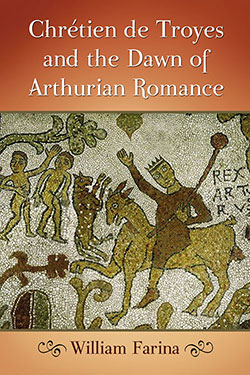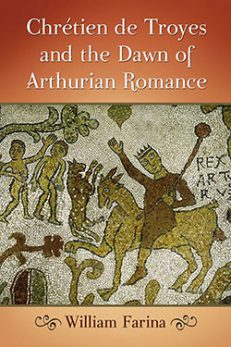Chrétien de Troyes and the Dawn of Arthurian Romance
$29.95
In stock
About the Book
During the late 12th century, the Arthurian legends first took their form in the imagination of French-speaking romancers. Foremost among these poets was the great Chrétien de Troyes, credited with incorporating into the Arthurian tradition the quest for the Holy Grail and the adulterous affair between Lancelot and Guinevere. This critical text explores the French roots of the legends and the source material of the individual characters, with special attention to the creative role played by de Troyes, whose contribution to the saga continues to shape and inform the modern imagination.
About the Author(s)
Bibliographic Details
William Farina
Format: softcover (6 x 9)
Pages: 255
Bibliographic Info: notes, bibliography, index
Copyright Date: 2010
pISBN: 978-0-7864-4866-1
eISBN: 978-0-7864-5794-6
Imprint: McFarland
Table of Contents
Acknowledgments ix
Introduction 1
PART I. LITERARY THEMES: THE POET
1. Everyone Knows Lancelot Was French 11
2. Arabic Roots 19
3. From Wales to Brittany and Beyond 28
4. Medieval Feminism 36
5. Cligès, the Anti-Tristan 44
6. A Melting Pot of Ideas 52
7. The Desecration of Aquitaine 60
8. An Arthurian Geography Lesson 67
9. Geoffrey of Monmouth Proves Reading Is Believing 76
PART II. HISTORICAL THEMES: THE KNIGHT
10. The Birth of Chivalry 87
11. Erec, Enide, and the Pitfalls of Happiness 95
12. The Achievement of Malory 103
13. Restless Second Sons 111
14. Legacy of the Crusader Kingdoms 118
15. Normans Gone Native 126
16. The Fragile and Hard-Won Sanity of Yvain 134
17. A Dreadful Foreboding 143
PART III. RELIGIOUS THEMES: THE CLERGYMAN
18. Good Guys, Bad Guys, and No In-Betweens 155
19. The Problem with Merlin 164
20. Triumph of the Gothic 171
21. Perceval Gets Religion in Spite of Himself 179
22. The Grail and the Lance 187
23. Ecclesia Versus Synagoga 195
24. Chrétien Who? 203
Conclusion 211
Timeline of the High Middle Ages, 1000–1300 217
Chapter Notes 219
Bibliography 237
Index 241





